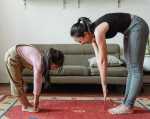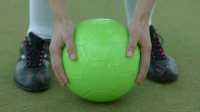Author Interviews, Brigham & Women's - Harvard, Cognitive Issues, Exercise - Fitness / 23.04.2022
Long-Term Health Outcomes Associated with College Football
MedicalResearch.com Interview with:
Robert A. Stern, Ph.D.
Professor of Neurology, Neurosurgery, and Anatomy & Neurobiology
Director of Clinical Research, BU CTE Center
Senior Investigator, BU Alzheimer’s Disease Research Center
Boston University School of Medicine
MedicalResearch.com: What is the background for this study?
Response: The link between playing American football at the professional level and later-life brain disorders like chronic traumatic encephalopathy – or CTE -- and ALS has received increasing attention over the past 15 years. Previous research has shown that former NFL players are more likely to die from CTE and amyotrophic lateral sclerosis (ALS) and more likely to report cognitive impairment, behavioral changes, and dementia during life. Despite previous research focusing on the later-life effects of playing American football at the professional level, the long-term effects of college football participation remain largely unknown.
We had two goals for this new investigation. The first was to conduct a survey of the current overall health status, including cognitive and other neurological disorders, of older former college American football players compared with men in the general population. The second goal was to examine the mortality rate and causes of death in a cohort of older former college football players. The target population for this study was all 447 former Notre Dame football players who were listed as seniors on the varsity rosters during the 1964-1980 seasons. This was the era of legendary coaches Ara Parseghian and Dan Devine. I should add that this study was fully independent of the University of Notre Dame.
(more…)



 Sean C. Rose, MD
Child Neurology
Nationwide Children’s Hospital
The Ohio State University, Columbus
MedicalResearch.com: What is the background for this study? What are the main findings?
Response: There is conflicting evidence regarding the association between repetitive head impacts during youth contact sports and worse neurocognitive outcomes. Most research has been conducted in older adults, while the research in children is mostly limited to 1-2 sports seasons.
Sean C. Rose, MD
Child Neurology
Nationwide Children’s Hospital
The Ohio State University, Columbus
MedicalResearch.com: What is the background for this study? What are the main findings?
Response: There is conflicting evidence regarding the association between repetitive head impacts during youth contact sports and worse neurocognitive outcomes. Most research has been conducted in older adults, while the research in children is mostly limited to 1-2 sports seasons.



 Amanda Paluch, PhD
Assistant Professor
University of Massachusetts Amherst
Department of Kinesiology
Institute for Applied Life Sciences
Life Science Laboratories
Amherst, MA 01003
MedicalResearch.com: What is the background for this study?
Response: We wanted to understand the association of total steps per day with premature mortality among middle-aged, Black and White women and men. This study included 2110 adults; age 38-50 years old at the start of this study. These adults wore a step counting device for one week and then followed for death from any cause over the next 10 years.
Amanda Paluch, PhD
Assistant Professor
University of Massachusetts Amherst
Department of Kinesiology
Institute for Applied Life Sciences
Life Science Laboratories
Amherst, MA 01003
MedicalResearch.com: What is the background for this study?
Response: We wanted to understand the association of total steps per day with premature mortality among middle-aged, Black and White women and men. This study included 2110 adults; age 38-50 years old at the start of this study. These adults wore a step counting device for one week and then followed for death from any cause over the next 10 years.







 The first step that you should take to finding inner peace is to practice yoga and meditation regularly. Yoga and meditation can give you the chance to slow down and reflect, as well as to clear your mind of the worries and negative thoughts that are concerning you. Not only this, but deep breathing is also an important aspect of both yoga and meditation as this can help you to ground yourself and to reconnect with the world around you.
The first step that you should take to finding inner peace is to practice yoga and meditation regularly. Yoga and meditation can give you the chance to slow down and reflect, as well as to clear your mind of the worries and negative thoughts that are concerning you. Not only this, but deep breathing is also an important aspect of both yoga and meditation as this can help you to ground yourself and to reconnect with the world around you.













